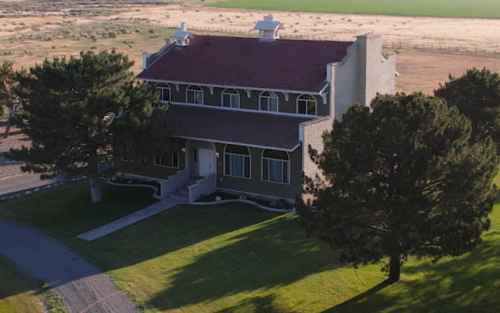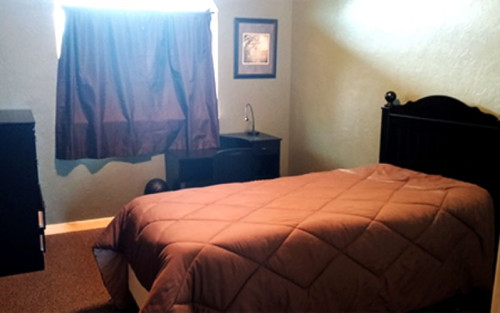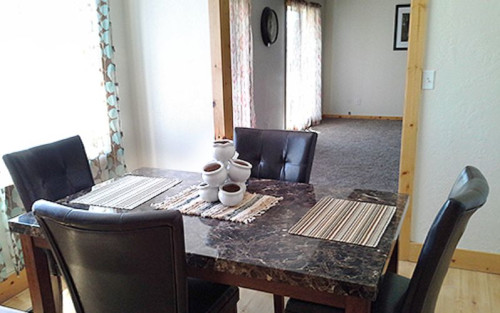






Paradise Creek Recovery Center
Treatment Focus
This center provides behavioral addiction treatment tailored to your unique concerns and symptoms, all in a supportive and compassionate environment.
Primary Level of Care
Offering intensive care with 24/7 monitoring, residential treatment is typically 30 days and can cover multiple levels of care. Length can range from 14 to 90 days typically.
This provider hasn't verified their profile's information. Are you the owner of this center? Claim your listing to better manage your presence on Recovery.com.
Treatment Focus
This center provides behavioral addiction treatment tailored to your unique concerns and symptoms, all in a supportive and compassionate environment.
Primary Level of Care
Offering intensive care with 24/7 monitoring, residential treatment is typically 30 days and can cover multiple levels of care. Length can range from 14 to 90 days typically.
Private Pay
You pay directly for treatment out of pocket. This approach can offer enhanced privacy and flexibility, without involving insurance. Exact costs vary based on program and length of stay. Contact the center for specific details.
Paradise Creek Recovery Center
Paradise Creek Recovery Center
About Paradise Creek Recovery Center
Paradise Creek Recovery Center, located near the City of Rocks National Reserve in Idaho, treating up to 8 individuals at a time struggling with sex or porn addiction, as well as co-occurring mental health and substance use issues. They offer residential programs on their scenic campus that last 28-120 days.
Paradise Creek admits clients from all around the U.S. and can take clients with complex situations. They transport clients between their center and the Salt Lake City airport.
Retraining the Brain
Paradise takes an evidence-based and trauma-informed approach to treating sex addiction that focuses on neuroplasticity, retraining the brain. They use cognitive behavioral therapy (CBT) sessions with a counselor eye movement desensitization and reprocessing (EMDR), 12-Step Facilitation, adventure outings focused on meditation, and experiential groups. Clients meet with their therapist multiple times a week for productive, intensive discussions that focus on trauma, motivation, and relapse prevention training.
Depending on what types of constructive activities clients find useful, they can participate in evening campfire groups or some art or music groups to connect with other clients.
Restoring Family Connections
Family members and partners can participate in the client's recovery by attending virtual therapy sessions. They can also visit and attend family therapy in-person on dedicated weekends from Friday to Sunday.
Paradise considers family and relational issues that contribute to sex addiction, including betrayal trauma.
Meditating in Nature
Paradise's mountainside facility offers amenities like exercise equipment, walking trails, and yoga sessions to promote physical well-being. Clients often leave the property to meditate at the nearby City of Rocks or other natural wonders.
Resolving Legal Concerns
Paradise Creek counsels clients who have been arrested for sexual activity, including child porn. Although they aren't part of the legal system, they admit clients who are awaiting trial. They also take clients would like to begin therapy before going to a different treatment facility that the Department of Corrections is sending them to.
Paradise focuses their therapy on identifying core issues that contribute to sexual addiction, so they aim to address the issues that lead to involvement in the justice system.
Supporting Long-Term Recovery
In addition to group outings and therapy, clients can connect with fellow attendees through a free weekly aftercare group. Paradise wants clients to have support from other people in recovery who can understand what they're going through and provide encouragement.

Center Overview
Treatment Focus
This center provides behavioral addiction treatment tailored to your unique concerns and symptoms, all in a supportive and compassionate environment.

Pricing and Program Length
Estimated Center Costs
The cost listed here ($32,790/6 weeks), is an estimate of program cost. Center price can vary based on program and length of stay. Contact the center for more information. Recovery.com strives for price transparency so you can make an informed decision.
Levels of Care




Your Care Options
Specializations
Expressive Arts
Creative processes like art, writing, or dance use inner creative desires to help boost confidence, emotional growth, and initiate change.
Sex Addiction
Compulsively seeking out sex can easily become a problem. This addiction is detrimental to relationships, physical health, and self-esteem.
Twelve Step
Incorporating spirituality, community, and responsibility, 12-Step philosophies prioritize the guidance of a Higher Power and a continuation of 12-Step practices.
Neurofeedback
During therapy, patients observe their own brain waves as interpreted by an EEG. This empowers them to understand and regulate emotional responses.
Who We Treat
Men and Women
Men and women attend treatment for addiction in a co-ed setting, going to therapy groups together to share experiences, struggles, and successes.
Approaches
Evidence-Based
A combination of scientifically rooted therapies and treatments make up evidence-based care, defined by their measured and proven results.
Family Involvement
Providers involve family in the treatment of their loved one through family therapy, visits, or both–because addiction is a family disease.
Individual Treatment
Individual care meets the needs of each patient, using personalized treatment to provide them the most relevant care and greatest chance of success.
Twelve Step
Incorporating spirituality, community, and responsibility, 12-Step philosophies prioritize the guidance of a Higher Power and a continuation of 12-Step practices.
Therapies
1-on-1 Counseling
Patient and therapist meet 1-on-1 to work through difficult emotions and behavioral challenges in a personal, private setting.
Art Therapy
Visual art invites patients to examine the emotions within their work, focusing on the process of creativity and its gentle therapeutic power.
Couples Counseling
Partners work to improve their communication patterns, using advice from their therapist to better their relationship and make healthy changes.
Experiential Therapy
With this approach, patients heal by doing. Therapists help patients process difficult emotions to speak, using guided activities like art or dance.
Expressive Arts
Creative processes like art, writing, or dance use inner creative desires to help boost confidence, emotional growth, and initiate change.
Eye Movement Therapy (EMDR)
Lateral, guided eye movements help reduce the emotional reactions of retelling and reprocessing trauma, allowing intense feelings to dissipate.
Family Therapy
Family therapy addresses group dynamics within a family system, with a focus on improving communication and interrupting unhealthy relationship patterns.
Music Therapy
Singing, performing, and even listening to music can be therapeutic. Music therapy sessions are facilitated by certified counselors.
Relapse Prevention Counseling
Relapse prevention counselors teach patients to recognize the signs of relapse and reduce their risk.
Conditions We Treat
Pornography Addiction
A person with a porn addiction is emotionally dependent on pornography to the point that it interferes with their daily life and relationships.
ADHD, ADD
ADHD is a common mental health condition caused by dopamine imbalance. Common symptoms include inattention, hyperactivitiy, and impulsivity.
Anxiety
Anxiety is a common mental health condition that can include excessive worry, panic attacks, physical tension, and increased blood pressure.
Obsessive Compulsive Disorder (OCD)
OCD is characterized by intrusive and distressing thoughts that drive repetitive behaviors. This pattern disrupts daily life and relationships.
Sex Addiction
Compulsively seeking out sex can easily become a problem. This addiction is detrimental to relationships, physical health, and self-esteem.
Stress
Stress is a natural reaction to challenges, and it can even help you adapt. However, chronic stress can cause physical and mental health issues.
Trauma
Some traumatic events are so disturbing that they cause long-term mental health problems. Those ongoing issues can also be referred to as "trauma."
Substances We Treat
Co-Occurring Disorders
A person with multiple mental health diagnoses, such as addiction and depression, has co-occurring disorders also called dual diagnosis.
Languages
Aftercare
Care Designed for Your Needs
Personal Amenities
Amenities
Special Considerations
Healthy Meals are provided
Great food meets great treatment, with providers serving healthy meals to restore nutrition, wellbeing, and health.
Activities
Yoga
Yoga is both a physical and spiritual practice. It includes a flow of movement, breathing techniques, and meditation.
Off-Site Activities
Off-Site Amenities






